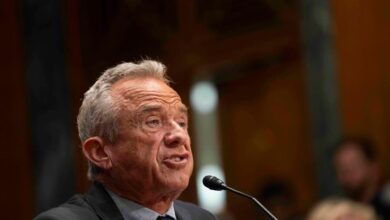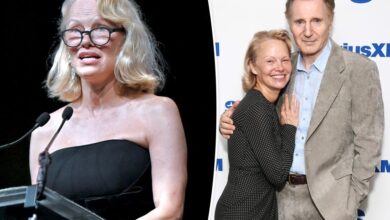‘Highest 2 Lowest’ Movie Ending Explained: The Meaning Behind the New Spike Lee and Denzel Washington Movie
The new Denzel Washington and Spike Lee movie, Highest 2 Lowest, is now streaming on Apple TV+, after a three-week limited run in movie theaters.
Highest 2 Lowest is Lee’s modern-day, American take on the classic 1963 Japanese crime film, Akira Kurosawa’s High and Low. Washington stars as David King, a wealthy music mogul, while frequent Lee collaborator Ilfenesh Hadera stars as his on-screen wife, Pam King. Also starring Jeffrey Wright, ASAP Rocky, and Ice Spice, Highest 2 Lowest has received positive reviews from critics so far, and is likely to be a contender in this year’s award season. It’s the fifth team-up between Oscar-wining filmmaker Spike Lee and Oscar-winning actor Denzel Washington, and the pair’s first team-up since 2006’s Inside Man.
The film has received mixed-to-positive reviews from critics, but is sure to get a lot more viewers now that audiences can stream the film at home. If you find yourself lost while watching, don’t worry, because Decider is here to help. Read on for a break-down of the Highest 2 Lowest movie plot summary and the Highest 2 Lowest movie ending explained.

Highest 2 Lowest movie plot summary:
David King (Denzel Washington) is a big-time, New York City-based music producer, whose record label, Stackin’ Hits Records, is not quite so big as it used to be. Though he founded the label, King sold the majority of his shares in Stackin’ Hits—a move he now regrets. The label is making decisions King doesn’t agree with—like working with AI-produced music—and King wants the power back.
When a rival label offers to buy out Stackin’ Hits Records, King decides to make his own offer to buy back his shares. In order to get the money to do this, he uses his Dumbo penthouse and art collection from Black artists as collateral for a loan. King’s wife Pam (Ilfenesh Hadera), isn’t happy that King is putting their lives and family at risk to cling to what she sees as a dying career. She reminds King that in the early days, he loved discovering new, underground talent. Now, she says, all he does is complain about the state of the industry.
King stubbornly believes he can get back to the glory days of his career if he has control over Stackin’ Hits. All of that is derailed when King receives a phone call from an anonymous kidnapper, who says he has King’s teenage son, Trey (Aubrey Joseph). The kidnapper demands a $17.5 million ransom. King and Pam contact the police and FBI, and agree they will pay the ransom for the safe return of their son. However, it’s soon revealed that the kidnapper made a mistake and accidentally took the son of King’s driver and longtime friend, Paul (Jeffrey Wright).

Trey is home safe, but the kidnapper threatens to kill Paul’s son, Kyle (Elijah Wright) if King doesn’t pay the ransom. Initially, King refuses. Despite pleas from Paul, Trey, and law enforcement, King doesn’t want to give up $17.5 million for someone else’s kid—even if it means Kyle dies. However, King’s partner at the record label (Michael Potts) convinces King that if he doesn’t pay the ransom, and lets Kyle die, that his public reputation—and the label’s reputation—will never recover. King reluctantly agrees to pay the ransom, with the understanding that law enforcement will be able to get the money back after Kyle is brought to safety.
King agrees to make the exchange with the kidnapper (played by ASAP Rocky) on the subway. In the confusion of the Puerto Rican Day celebrations and the crowd for a Yankees game, the kidnapper manages to get away with the money. The police don’t catch him. Kyle, who has been brutally beaten, is released. The police press Kyle to remember any details about his kidnapper, and Kyle recalls a rap song he’d never heard before with the lyrics “from the front to the back.”
King is now revered as a hero by the public, for paying the ransom to get Kyle back. However, the bank that King used to take out the $17.5 loan—using his house and his art as collateral—is less forgiving, and tells King he has two weeks to pay back the loan before they will take his stuff. King tries to go ahead with the buyout deal for Stackin’ Hits, to get the money, but the positive publicity surrounding King’s heroism has several Stackin’ Hits songs climbing the charts. The other owners no longer want to sell right away, thinking they can get a better deal.
In other words, King is screwed. He feels like he’s being punished for doing the right thing. But then, while listening to some demo tapes that have been sent to him, King recognizes the “from the front to the back” lyrics, as well as the voice of the kidnapper. He realizes the kidnapper must be this aspiring rap artist, Yung Felon.

When the cops don’t take him seriously, King and Paul decide to take matters into their own hands. They track down Young Felon’s girlfriend Marisol (played by Ice Spice), in their old neighborhood in the Bronx. Marisol tells King that Yung Felon idolizes King—and basically stalked him on social media—and dreamed of the day King would discover him.
King and Paul pay a visit to the recording studio where Marisol says Yung Felon will be. King asks Paul to wait outside while he confronts Yung Felon in the recording studio. King tells the rapper he has potential, and gives him some pointers. Yung Felon tells King he saw him as a father figure, and finally snapped after King ignored him for years. Felon flees—injuring Paul with a gun shot as he does—and King follows him onto the subway. This time, King prevails, and catches up to Felon. Felon pleads with King to just let him down, but King knocks him out instead.
With Yung Felon in custody, law enforcement recovers the ransom money from his apartment. King and Paul have reconciled, although Paul politely refuses King’s offer to come work with him. Perhaps, despite Paul’s unwavering loyalty, deep down he realizes King doesn’t have that same loyalty to him. Yung Felon accepts a plea deal and gets 25 years in prison. He asks to meet with King in prison, and King agrees.
Highest 2 Lowest movie ending explained:
Before we see King speaking to Yung Felon in prison, there’s a fantasy sequence in which Yung Felon is in a music video rapping his now-hit song, “Trunk,” while King vibes to the song. The implication is that Yung Felon made a music video from prison, and it’s gone viral.
Yung Felon happily tells King that he’s now the top-streaming artist, and he has offers from all the major record labels. But Yung Felon wants to sign with his idol at Stackin’ Hits Records. To Yung Felon’s anger and disappointment, King rejects the offer. King reveals he is leaving Stackin’ Hits Records to start a new, smaller label, which will give him more time to spend with his family and more time to focus on the music.
In the final scene of the movie, the King family is gathered in their penthouse to listen to a new up-and-coming artist named Sula (Aiyana-Lee). Sula sings a song called “Highest 2 Lowest,” with lyrics about being underestimated for being young, coming out of a bad relationship, and seeing life clearly now. King loves the song, and the family agrees to sign Sula to their label and start recording her. With that, the movie ends.
Highest 2 Lowest movie meaning:
The lesson that King needs to learn in Highest 2 Lowest is stated at the beginning of the movie by his wife: He got so caught up in career success, that he lost sight of what was important, which is his family and his love of music. By the end of the movie, King has learned this lesson. Yung Felon tempts King to go back to his old mentality with the offer of what could be the biggest, most lucrative deal in the music business. But King rejects the offer. He’s rewarded for making the right choice by Sula’s song—a song that truly moves King, and reminds him why he loves music.
Ironically, Yung Felon helped King rediscover his love of music. The moment in the recording booth, with King coaching Felon, is a moment of genuine connection that reminds King why he loves the business. However, once Felon goes viral, he loses sight of the music. He only cares about money and career, like King at the beginning of the movie. And so, King walks away.
But hey, that’s just my interpretation of the movie. If you have a different take, let me know in the comments.
Credit to Nypost AND Peoples



